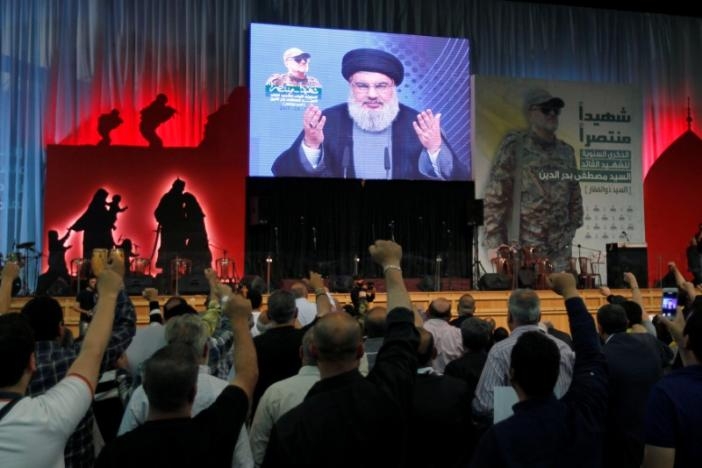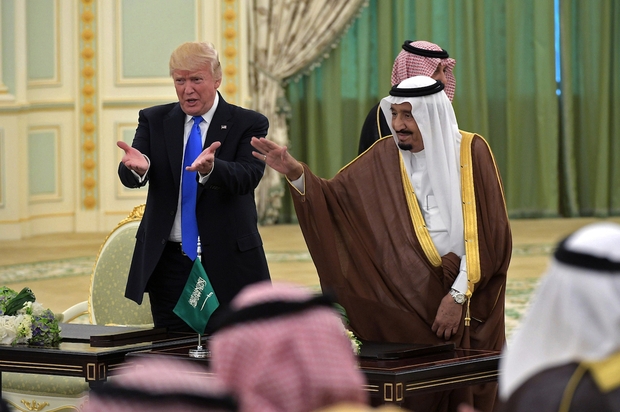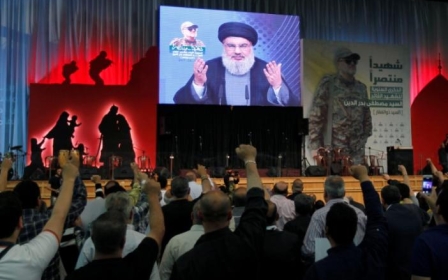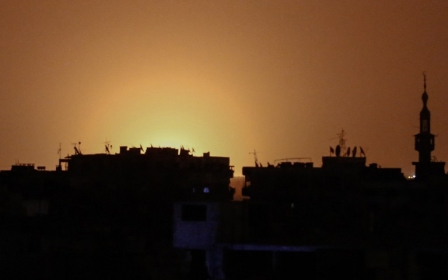Israel, Hezbollah and Lebanon: The potential for another war

Israel’s 2006 war with Lebanon was not decisive: the Israelis failed to eliminate Hezbollah.
During the intervening decade, there has been anticipation here and there of yet another war or series of skirmishes. But while regional uprisings and armed conflicts emerged, that confrontation never came.
But the chatter from both Israel and Hezbollah of late has increased speculation about the potential for another war.
Hezbollah has since gained even greater political influence in Lebanon, and become a key regional player in Syria, Iraq and Yemen
While putting them under the same umbrella as Islamic State and al-Qaeda, he also ignored the Gulf states' role in war and repression across the region, notably in Yemen and Bahrain. If anything, he praised it.
A war is looking likely again, but it will not resemble that which happened back in 2006.
Hezbollah has since gained even greater political influence in Lebanon and become a key regional player in Syria, Iraq and Yemen.
Israel, on the other hand, has become even more relentless than before. One can only expect that it will be more trigger-happy than it was 11 years ago.
The Lebanese army and Hezbollah? It’s complicated
Lebanon touts its security apparatus as the Lebanese Army and the resistance, which, in other words, is Hezbollah.
President Michel Aoun, whose party, the Free Patriotic Movement, has shared strong ties with Hezbollah since a memorandum of understanding in 2006, has echoed these sentiments.
In an interview with Egypt’s CBC TV in February, Aoun said: "As long as the army doesn't have the needed power to fend off [Israel’s] threats ... We feel the need for [Hezbollah's] weapons to be there to complement the role of the army."
This sounds like a straightforward idea, particularly considering the fact that Israel still occupies Shebaa Farms and routinely violates Lebanese airspace and borders.
While the United States has showered the Lebanese Army with military aid, most recently 1,000 machine guns and heavy artillery, those have clearly been intended for securing the eastern border against Islamic State (IS) group and Jabhat Fateh al-Sham (formerly Jabhat al-Nusra). Securing the southern border? There was no mention of it whatsoever.
The lines are very blurred. Hezbollah made headlines worldwide in April after giving local and international media an impromptu tour of Lebanon's southern border.
The following day, the Lebanese state immediately sent a delegation to the southern border to flex its muscles in the shape of Prime Minister Saad Hariri, Army Commander Joseph Aoun, and Defence Minister Yaacoub Sarraf.
Hariri was openly critical of Hezbollah's media tour, saying that the Lebanese government found the entire charade "unacceptable".
"I am visiting the south and the Blue Line [the border between Lebanon and Israel] today ... to thank our troops, and to tell the Lebanese Armed Forces that they and only they are the legitimate force in charge of defending our borders," Hariri said.
There have been more direct diplomatic confrontations between the state and Hezbollah. Take the small eastern border town of Tfail which, despite being on Lebanese territory, is almost entirely under the auspices of the Syrian state.
Used as a strategic point for Hezbollah in its clashes with various armed groups in the Qalamoun Mountains, most of the town's 2,500 residents eventually fled across eastern Lebanon.
As long as the army doesn't have the needed power to fend off [Israel’s] threats ... We feel the need for [Hezbollah's] weapons to be there to complement the role of the army
- President Michel Aoun, Lebanon
Earlier this month, Hezbollah co-founder and head of its Shariah Council, Sheikh Mohammad Yazbeck, met with displaced Tfail residents, mayors from eastern Lebanon and others, to guarantee their return to their homes within one week under the Lebanese state’s protection. Interior Minister Nouhad Machnouk, who is responsible for Lebanon’s Internal Security Forces, denied these claims.
Fast forward to 11 May. Hezbollah secretary-general Hassan Nasrallah said in his speech that "Hezbollah's presence in the area [Tfail] ended when the mission was accomplished," signaling the return of residents. That same day, the interior minister posted a picture on Twitter with a delegation from Tfail. Who's calling the shots here?
But what does this all mean? Consider trends in Israeli military assaults, be they in Lebanon or Gaza. Now note how the lines have blurred between Lebanon's state security apparatus and Hezbollah's armed wing. It all means that Israel can cry terrorism on a wider range of non-combatant targets.
In 2006, those lines were clearer. This does not in any way justify the inhumane assaults that killed, wounded, and displaced civilians and marginalised the predominantly Shia community of south Lebanon. But it did make it clearer where Israel was likely to strike. This is no longer the case.
Hezbollah's resistance enterprise
Within Lebanon's borders, Hezbollah has clearly flexed its muscles. It has revealed that it is more than the popular movement fighting occupation and invasion, which it often advertises itself to be.
In late March, Lebanon was thrown a major curveball. Photos emerged of Hezbollah forces patrolling the Burj al-Barajneh neighbourhood south of Beirut, carrying heavy-assault weapons and conducting raids on drug warehouses.
Various security sources told The Daily Star that Hezbollah often coordinates with Lebanese security forces when it comes to these kinds of issues in areas under the group's influence. Was this the first of more to come?
The coordination between the army and Hezbollah has definitely played a vital role in cracking down on extremists from IS and al-Qaeda
On the outskirts of Arsal, a border town in northeast Lebanon, extremists from IS and Jabhat Fateh al-Sham have been entrenched since 2014.
While the Lebanese Army has invested the vast majority of its resources to handle the situation, it’s important to mention Hezbollah's involvement, both militarily and logistically. This is something that its media platform Al-Manar has reported numerous times. In one case, Hezbollah used drones to monitor the situation, and conducted various attacks, prior to the army's helicopter strikes.
The coordination between the army and Hezbollah has definitely played a vital role in cracking down on extremists from IS and al-Qaeda, as well as the clashes in Arsal.
However, the next time Israel gives itself a reason to invade Lebanon, one can expect them to consider the state and its security apparatuses as "Hezbollah" or allies.
In short, this red herring will be used to justify a larger-scale military assault and invasion.
Hezbollah ventures beyond borders
Outside Lebanon's borders, Hezbollah has exported itself to other areas of conflict in the region.
Hezbollah has supported, and even established, multiple militias and factions in Syria, most notably al-Ghaliboun and Quwat al-Ridha. These groups are often referred to under the larger umbrella of "Syrian Hezbollah".
Outside Lebanon's borders, Hezbollah has exported itself to other areas of conflict in the region
At this point in time, these organisations remain out of the spotlight. But as the conflict in Syria slowly wanes, their presence could guarantee Hezbollah a security and political foothold in Syria.
This might be especially likely, considering Hezbollah's existing impact on Syria, whether it was changing the tide of the conflict through its military victory in the Battle of al-Qusair in 2013, or its role in devastating sieges, notably in Madaya.
There was also the news about a Syria-based force to liberate the occupied Golan Heights, which had been led by Lebanese Hezbollah militant Samir Kuntar, who was assassinated in an air strike on 19 December 2015 in Jaramana, a city in the Damascus suburbs.
Following his assassination, it was revealed that Kuntar and Hezbollah formed an armed brigade called the "Syrian Resistance for the Liberation of Occupied Golan".
Fast forward to March 2017: Harakat al-Nujaba, a powerful Iraqi militia backed by Iran, announced the formation of the "Golan Liberation Brigade" and revealed its involvement in Syria alongside Hezbollah.
A year earlier, a spokesperson from Nujaba said that his group and Hezbollah were "twins of resistance that cannot ever be loosened or separated".
On the one hand, Hezbollah's increased military capability could be a deterrent for another Israeli invasion.
On the other hand, if you factor in the increasing tensions between Hezbollah and Israel, then it could also prove to be the motivation for an invasion. This is considering that the 2006 war did not end in the latter's favour.
Tensions mount between Hezbollah and Israel
In recent months, Hezbollah and Israel have butted heads in ways that go beyond Israel's routine violation of Lebanese airspace and territorial borders.
However, an interesting twist is Lebanon's exploration of the oil and gas sector, which has been a priority for Energy Minister Cesar Abi Khalil and the cabinet as a whole.
Of the five maritime blocks available for bidding, Israel considers three of them to be in their waters. In late March, Israel introduced a bill to the Knesset that would effectively annex the three maritime blocks, comprising an estimated 800 square kilometers of water.
There's also the fact that Israel has almost routinely conducted air strikes on Syria, often claiming to have targeted Hezbollah arms convoys and the like. There are several cases where Israel has trespassed on Lebanese borders to carry out these attacks and avoid Russian anti-air defences. The most recent documented air strike took place on 4 May.
The Lebanese institutions, its infrastructure, airport, power stations, traffic junctions, Lebanese army bases – they should all be legitimate targets if a war breaks out
- Naftali Bennet, Israeli education minister
Influential Israeli officials have also stepped up their pro-war rhetoric since Aoun's election, due to his strong ties with Hezbollah.
Israel's education minister, Naftali Bennett, who is also a member of the country's security cabinet, believes that all of Lebanon should be a fair target for Israeli attacks in the future.
"The Lebanese institutions, its infrastructure, airport, power stations, traffic junctions, Lebanese army bases – they should all be legitimate targets if a war breaks out," he said in March.
"That's what we should already be saying to them and the world now. If Hezbollah fires missiles at the Israeli home front, this will mean sending Lebanon back to the Middle Ages."
Then in early April, Bennett reaffirmed and elaborated on his sentiments in a blog post in The Times of Israel titled "Hezbollah is Lebanon is Hezbollah".
"Unlike last time," he said, "if we defend ourselves against a future Lebanese attack we will not use tweezers to search for a needle in a haystack: we will neutralise the haystack."
If killing 900 civilians in the six-week 2006 war was searching for a needle in a hay stack then, given the current circumstances, what would neutralising the haystack look like?
- Kareem Chehayeb is a Lebanese writer and musician based in Beirut. You can follow him on Twitter @chehayebk
The views expressed in this article belong to the author and do not necessarily reflect the editorial policy of Middle East Eye.
Photo: Hezbollah leader Sayyed Hassan Nasrallah addresses his supporters from a screen in Beirut's southern suburbs on 11 May 2017 (Reuters)
New MEE newsletter: Jerusalem Dispatch
Sign up to get the latest insights and analysis on Israel-Palestine, alongside Turkey Unpacked and other MEE newsletters
Middle East Eye delivers independent and unrivalled coverage and analysis of the Middle East, North Africa and beyond. To learn more about republishing this content and the associated fees, please fill out this form. More about MEE can be found here.







